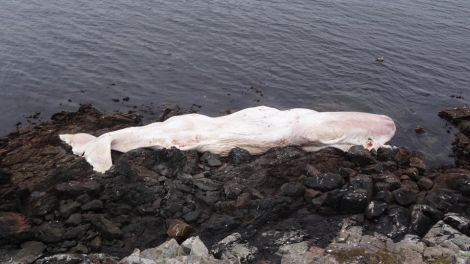Environment / Probe into what caused death of whales
FOUR deep water whales have washed up on various shores across Shetland over the last few weeks, raising concern that they may be linked with the deaths of over 80 whales washed up on the west coast of Scotland and Ireland during August and September.
Scientists have suggested that the deaths could be related to military activity in the Atlantic as well as oil and gas exploration work.
Three northern bottlenose whales have been found in Setter/Burra, Roe Sound/Muckle Roe and Fetlar with a sperm whale washed up in Mangaster.
All these animals were in a highly decomposed state and have been dead for a couple of weeks.
Karen Hall of the local Scottish Natural Heritage office said: “This is unusual for beached whales in Shetland to have so many in such a short space of time.
“The mass strandings in Scotland and Ireland over the last couple of months are the biggest numbers of Cuvier beaked whales so far in the world which is fairly serious.”
There have also been reports of a couple of Cuvier beaked whales washed up on the shore of Orkney and the Faroe Islands in the last month, while the Icelandic government is currently investigating the cause of the deaths of 12 northern bottlenose whales and three Cuvier beaked whales washed up off the country in July and September.
The Scottish Marine Animal Stranding Scheme (SMASS) have taken samples from the whales to test for pollutants and disease.
Hall said: “If the cause of death was pollutants then other species of sea life would be washed up in mass and you would expect to see whales washed up in different degrees of decomposition.
“These animals died in a relatively quick period of time far out at sea which doesn’t fit the patterns of disease related deaths and subsequent decomposition.
“These are more likely to be noise related deaths. Deep sea whales swim up to one kilometres in depth in the ocean and when forced to the surface too quickly in fright from a massive sonar disturbance experience decompression sickness or the bends similar to that of human divers.”
Become a member of Shetland News
Marine experts are suggesting the alarmingly high number of whale deaths may be related to sonar testing from foreign or UK military in the Eastern Atlantic to detect submarines.
Another possible cause may be the impact seismic surveys from deep sea oil and gas exploration has on whales due to loud blasts of compressed air being projected from seismic airguns through the deep sea water to reveal buried oil and gas deposits.
In the meantime, anyone who comes across a washed up whale or other marine animal is advised to report this directly to SMASS on 01463 243030 or in order that the information can be recorded to provide essential data as to the mysterious deaths of these animals.
Become a member of Shetland News
Shetland News is asking its many readers to consider paying for membership to get additional features and services: -
- Remove non-local ads;
- Bookmark posts to read later;
- Exclusive curated weekly newsletter;
- Hide membership messages;
- Comments open for discussion.
If you appreciate what we do and feel strongly about impartial local journalism, then please become a member of Shetland News by either making a single payment, or setting up a monthly, quarterly or yearly subscription.


























































